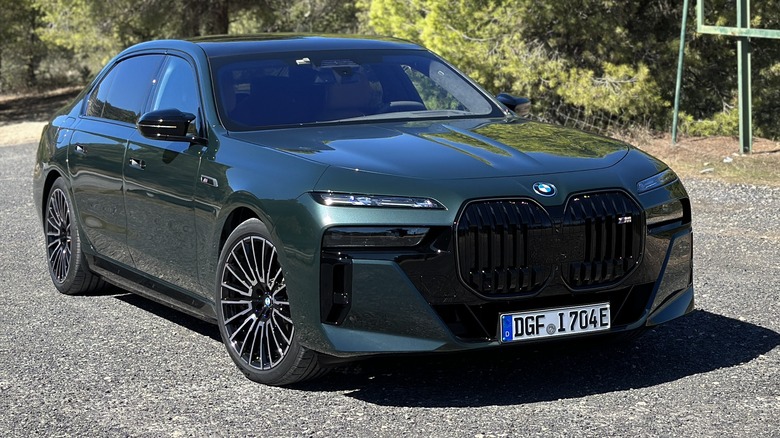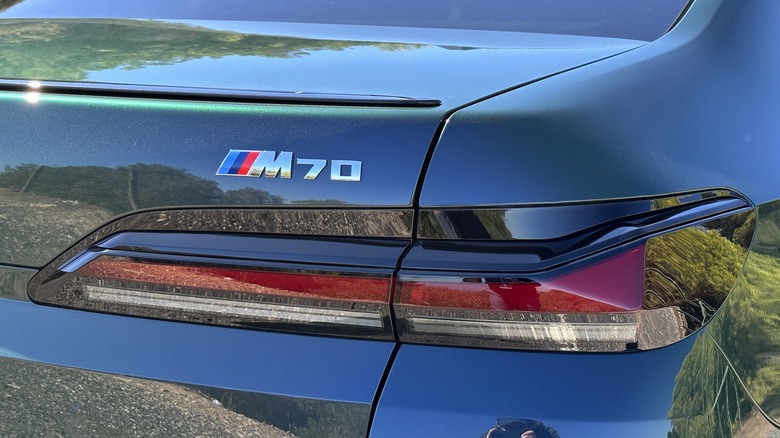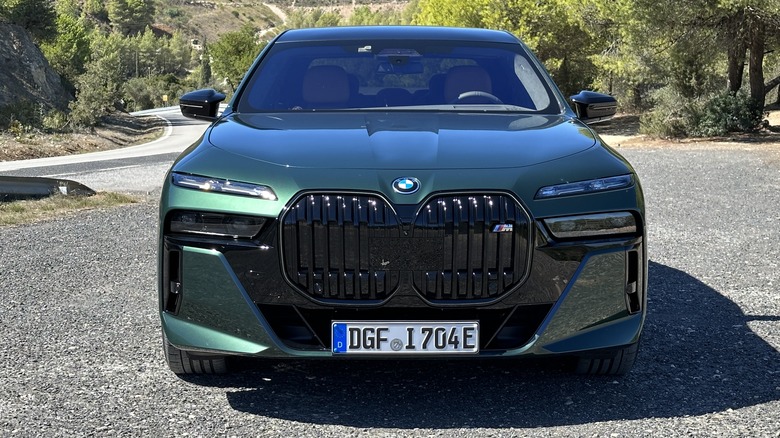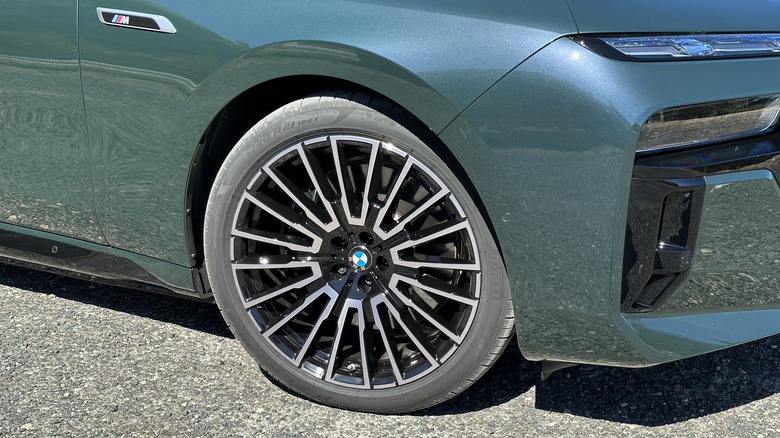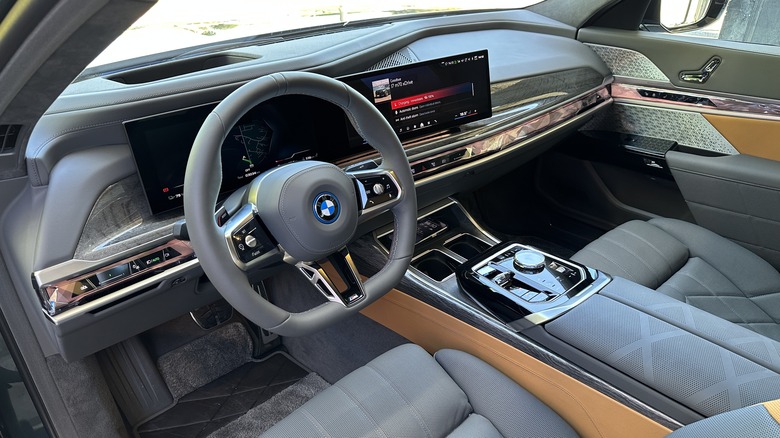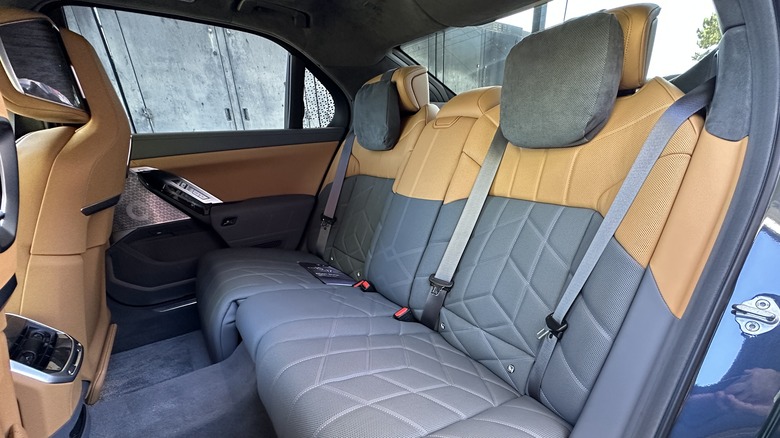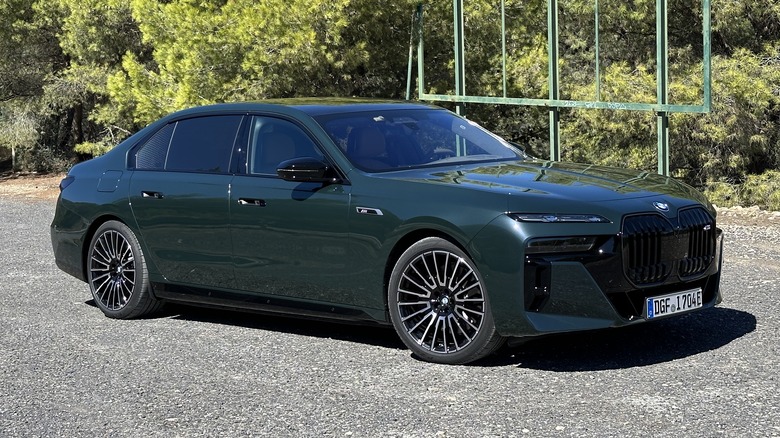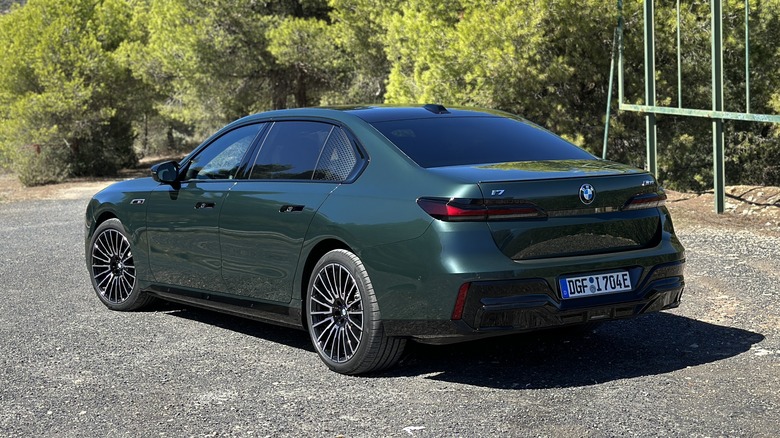2024 BMW i7 M70 First Drive: A Very Fast Argument For EV Excess
Drive a new BMW i7 xDrive60 and you'll have no complaints about its performance; what's not to like about a big, comfy, electric luxo-barge with 536 horsepower, 549 pound-feet of torque, and a 0-to-60 mph acceleration time of 4.5 seconds? But BMW wouldn't be BMW if it didn't struggle to leave well enough alone, and so we now have the even hotter i7 M70, giving the company's flagship increased power and presence – not to mention a big jump in price.
With its eye-watering $169,495 MSRP — which includes $995 for destination — the 2024 BMW i7 M70 is $44,300 more expensive than the i7 xDrive60. That's quite a pretty penny to pay for a boost in power. But, after driving the i7 M70 on the winding roads outside of Lisbon, Portugal, my gosh, it sure is tempting.
More power, quicker acceleration
The i7 M70 uses the same electric architecture as the lesser xDrive60, built around a 105.7-kilowatt-hour battery pack, of which 101.7 kWh is usable. Power is sent to electric motors mounted at both axles. But while the xDrive60's produces a combined 536 hp and 549 lb-ft, the M70 makes 650 hp and 748 lb-ft, and that torque spec can even bump up to 811 lb-ft for short bursts of on-demand boost.
What's interesting is that the M70's front electric motor is the same as the xDrive60's; both cars send 255 hp and 269 lb-ft of torque to the forward axle. Instead, the M70's rear drive unit is responsible for its added oomph, pumping out 483 hp and 479 lb-ft compared to the xDrive60's 308 hp and 280 lb-ft.
Because the two i7 variants share the same mechanical hardware, the M70 isn't much heavier than the xDrive60: its 12-pound weight increase is due to different wheels and other small chassis components. Even so, the i7 M70 is still a porker, tipping the scales at 5,929 pounds, but through this increase in power, BMW was able to shave a full second off the i7's 0-to-60 time; the M70 will run this same sprint in a scant 3.5 seconds.
Range takes a slight hit
According to the EPA, the 2024 BMW i7 M70 should get as much as 291 miles on a full charge. That isn't bad, all things considered. The most efficient version of the less-powerful i7 xDrive60 is rated to go 317 miles with the same battery pack, which is a noticeable discrepancy, sure, but not really that massive in the grand scheme of things. Like the xDrive60, the i7 M70 can DC fast-charge at a maximum speed of 195 kW.
For comparison, the i7 M70's closest competitor is the Mercedes-AMG EQS sedan, which has an EPA rating of 277 miles on a full charge. However, the AMG EQS can charge slightly faster, with a max speed of 207 kW — assuming your local public charging station is actually working correctly, of course. Overall, considering most EV buyers don't let their cars run down to super-low range, the BMW vs. Merc comparison is a bit of a wash.
A solid performer
To better handle the M70's extra power, the i7's standard two-axle air suspension has stiffer springs that reduce overall body motions, working in tandem with the sedan's active anti-roll tech. The steering has a little more weight to its action, as well, though the M70's 15.6:1 ratio is the same as the xDrive60's. The result is that the i7 isn't any sharper, it just feels a little better.
The M70 comes standard with 21-inch wheels on all-season tires, though you can optionally downsize to 20-inch wheels, where you get summer rubber. Incidentally, because of this, the i7 M70's range is longer with the larger wheel option instead of the smaller, and with EVs, the case is usually the opposite.
On narrow roads along Portuguese hills, the i7 M70 is surprisingly nimble and delightfully agile. The adaptive air suspension keeps this nearly 6,000-pound sedan feeling light on its feet, and there's decent communication through the thick-rimmed steering wheel. At the same time, the i7 M70 feels genuinely unflappable — sturdy and solid, like it'll never miss a beat. The experience livens up a bit if you switch to the i7's Sport drive mode, too, with increased throttle response.
No loss of cruising comfort
However, on more relaxed stretches of highway, the M70 retains the i7's supremely serene ride quality. This sedan feels like a 7 Series should: quiet, comfortable and like it could eat up thousands of miles at a time — or 291 miles, anyway. The M70 also comes with BMW's Highway Assistant, which works like Ford's BlueCruise or General Motors' Super Cruise, and allows you to take your hands off the steering wheel for extended periods of time on pre-mapped highways, and at speeds up to 80 mph.
My one complaint with the driving experience comes down to braking — or, rather, BMW's take on adaptive regeneration. Dig into the menus of the iDrive 8.5 operating system and you'll find different levels of regen — low, medium and high — as well as an adaptive setting. That latter programming works with the car's onboard GPS software to automatically increase or decrease the recuperation based on the road ahead. If the car senses you're approaching a tight turn, it'll up the regen as you approach.
This sounds fine in theory, but on more technical stretches of mountain roads, it makes for an inconsistent braking experience that's hard to learn, since it's constantly changing. It's less of an issue in the city or on long expanses of highway, and hey, at least you can turn it off.
Improved tech and a swanky cabin
That iDrive 8.5 tech is an updated version of the iDrive 8.0 operating system that launched in the 7 Series, and while the improvements are minor, they're meaningful. The home screen has been redesigned with commonly used widgets overlaid on top of a map, and there's a fixed row of buttons along the bottom for the most frequently opened menus. It's a small tweak, but one that makes iDrive easier to use.
You can also activate an AI virtual assistant with the usual "Hey, BMW" command, and if you feel like changing the wake-up word, go ahead. I won't tell you what I changed mine to during the test drive, but let's just say, BMW's software will allow, um, anything.
Beyond the tech, the M70's cabin is no different than other i7's, meaning it's an absolutely lovely place to while away the hours. Everything you touch feels great, the seats are supremely comfortable, there's lots of interesting ambient lighting and — a staple of the 7 Series — rear occupants can stretch out and relax, with small iPhone-sized screens in the doors to control many of the car's functions.
Looks... interesting
Debates still run rampant about whether or not the new BMW i7 is pretty, and the M70 doesn't change my opinion one bit. There are some blacked-out exterior trim bits, as well as a teensy little lip spoiler, but the most obvious change is the redesigned rear diffuser with big cutouts where exhaust pipes would be on a gas car (a design trend I absolutely loathe, by the way).
The M70 opens up a larger palette of available paint colors, including the Aurora Diamond Green seen on my test car. Combined with 20-spoke, 21-inch wheels, this car has an almost Alpina B7 vibe, and that's not a bad thing. You can have the i7 M70 done up in a bunch of two-tone combinations, too, many of which are absolutely hideous, while others look ace.
2024 BMW i7 M70 impresses – for a price
Whether or not the M70 is worth the upcharge compared to an i7 xDrive60 is sort of a moot point, since many full-size luxury sedan buyers simply want the best, no matter what it costs. Remember, there was a time where Mercedes-Benz offered both an S63 AMG and an S65 AMG, and — despite the less-expensive S63 actually being quicker and better to drive — people still bought the S65. To a certain audience, 65 is greater than 63, and that automatically makes it better. Similarly, M70 is greater than xDrive60. The end.
But it's not like you don't get a superb car for the money — and one I'd definitely have over a soap bar-shaped AMG EQS, even if the Mercedes costs a little less. The 2024 BMW i7 M70 takes all the greatness of the i7 and bolsters it with more performance and a little more curb appeal. What's not to like about that?
